Unveiling the dark passages of the Bible, this exploration challenges us to confront its complex morality and historical context.

Immorality in the Bible
Navigating the moral labyrinth of the Bible, you'll find yourself at the crossroads of divine commands and human ethics. It's a journey where tales of violence, the treatment of women, and the acceptance of slavery paint a complex picture of ancient societal norms.
You might ask yourself how these stories reconcile with modern morality, or if they even should. As you ponder these ancient texts, you'll uncover layers of interpretation that challenge conventional understandings.
Let's embark on this exploration together, questioning how to bridge the gap between then and now, without compromising the integrity of either.
Key Takeaways
- The Bible documents instances of immorality, highlighting humanity's flawed nature and the consequences of moral failings.
- Moral dilemmas in the Bible reflect ethical complexities, encouraging critical engagement with moral principles.
- Interpretive frameworks and historical context are crucial for understanding the moral messages in biblical texts.
- The tension between cultural relativism and universal morality in biblical ethics underscores the dynamic nature of moral interpretation.
The Dilemma of Divine Commands
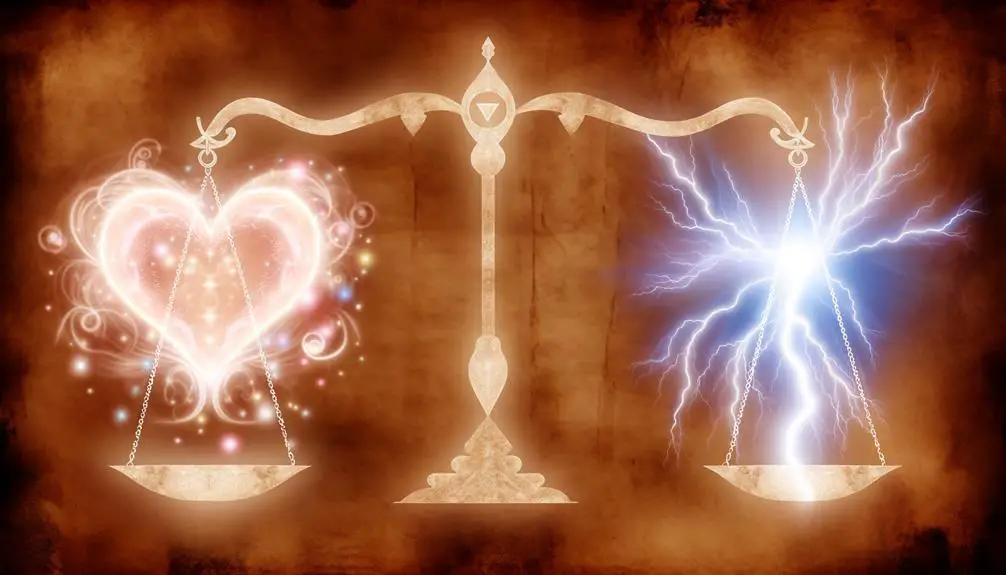
In examining the dilemma of divine commands, it's essential to analyze how these mandates challenge our understanding of morality. At the heart of this challenge are commanded killings, which present ethical paradoxes that defy simple moral reasoning. When you're told that an all-knowing, all-loving deity commands actions that, under any other circumstance, would be considered morally reprehensible, you're faced with a profound moral quandary.
This dilemma isn't merely academic; it strikes at the core of how you reconcile divine authority with ethical autonomy. If morality is derived from divine commands, then actions, no matter how seemingly immoral, are justified if commanded by the deity. However, this leads you to an ethical paradox where divine commands can contradict your innate sense of right and wrong, leading to cognitive dissonance and moral confusion.
Moreover, the issue of commanded killings raises questions about the nature of morality itself. If you accept that divine commands can override your moral intuitions, you're left questioning the foundation of your moral beliefs. Is morality inherently subjective, contingent upon divine will? Or is there an objective moral order that even divine commands can't supersede?
These questions aren't just theoretical; they've practical implications for how you understand and apply moral principles in your life. The dilemma of divine commands forces you to confront the possibility that morality isn't as clear-cut as you might hope, requiring you to navigate the murky waters of ethical paradoxes with care and thoughtful consideration.
Stories of Violence and Genocide

Numerous accounts throughout the Bible vividly recount episodes of violence and genocide, challenging readers to grapple with their implications on our understanding of morality and divine justice. These narratives don't just serve as historical or mythological recountings; they also present a complex framework for discussing the nature of human conflict and divine intervention.
One of the earliest examples, Cain's jealousy leading to the murder of his brother Abel, sets a precedent for the violent human behavior that's echoed throughout the biblical texts. This story not only highlights the severity of sibling rivalry and envy but also raises questions about accountability and the consequences of our actions. It's a poignant reminder of how personal vendettas can escalate into acts of irreversible violence.
Moving forward, the Tower of Babel story represents a different kind of divine intervention where human hubris challenges the limits set by divine authority. The scattering of peoples and the confusion of languages as a result of trying to build a tower to the heavens can be interpreted as a form of non-lethal divine retribution. However, it also underscores the consequences of collective human actions and the potential for these actions to lead to societal fragmentation and conflict.
These stories, among others, provide crucial insights into the Bible's complex portrayal of violence and genocide. They encourage a deeper examination of the texts, urging readers to consider the moral and ethical questions these stories raise. In doing so, they offer a valuable perspective on the enduring human struggle with violence, power, and the quest for justice.
The Treatment of Women
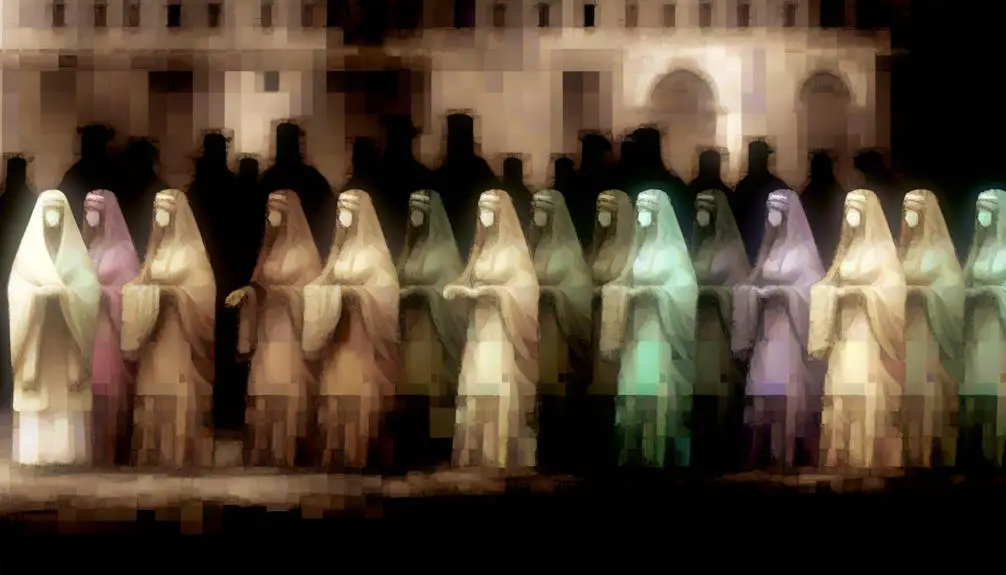
As you examine the treatment of women in the Bible, it's crucial to understand the context and implications of biblical gender roles and the denial of women's rights.
These elements reflect broader themes of power and societal norms within ancient texts. Analyzing these aspects offers insights into the historical and cultural underpinnings that have shaped contemporary interpretations and practices.
Biblical Gender Roles
Examining the treatment of women reveals complex gender roles deeply embedded within the Biblical narrative. You'll find that the Bible delineates specific expectations for women, particularly in the realms of marital duties and prophetic roles. Here's a closer look:
- Marital Duties: Women are often depicted as bearers of domestic responsibilities, expected to uphold the household and support their husbands.
- Prophetic Roles: Despite prevailing gender norms, the Bible presents instances where women assume significant spiritual roles, signaling a nuanced understanding of gender capabilities.
- Social Status: The social status of women, as reflected in Biblical texts, varies greatly, but often underscores their secondary position in society.
This analysis underscores the multifaceted portrayal of women, pointing towards an intricate tapestry of gender roles within the Biblical context.
Women's Rights Denied
While the Bible presents complex gender roles, it's also important to acknowledge instances where women's rights are notably curtailed or denied. The denial of female education and lack of focus on maternal health are prime examples. These limitations not only restrict women's personal growth but also impact their societal contributions.
Aspect |
Biblical Reference |
Impact on Women |
|---|---|---|
Female Education |
– |
Hindered intellectual and personal development |
Maternal Health |
– |
Increased health risks and mortality |
Legal Rights |
– |
Limited autonomy and societal participation |
This assessment suggests that the treatment of women within these texts often reflects broader patriarchal norms of the times, rather than an inherent immorality. It's crucial to analyze these aspects within their historical and cultural context to understand their implications fully.
Slavery in Biblical Times
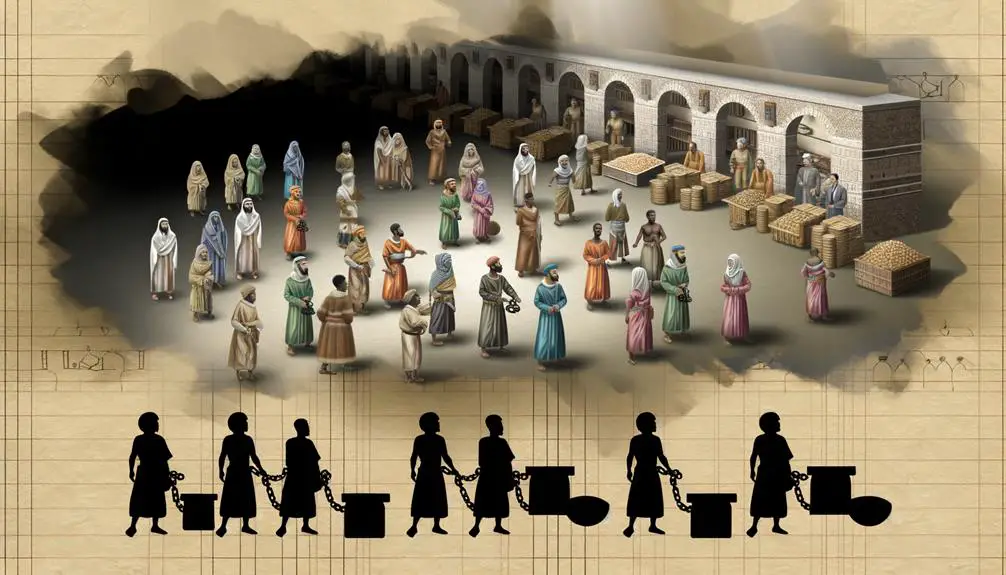
To understand the societal norms of biblical times, it's crucial to explore how slavery was both practiced and perceived within this historical context. Slavery, often viewed through a modern lens as inherently immoral, was a complex institution that reflected the economic and cultural reality of the era.
- Economic Dependency: The economies of ancient civilizations heavily relied on slavery. It wasn't simply a matter of owning people for the sake of dominance but a foundational aspect of maintaining agricultural and social structures. Slaves were often the backbone of the economy, engaged in various labor-intensive tasks that supported the livelihoods of entire communities.
- Cultural Acceptance: Unlike today's outright condemnation of slavery, biblical times saw it as a normative part of life. This acceptance wasn't only due to economic necessity but also because cultural and legal systems inherently supported the institution. Laws detailed the treatment and rights of slaves, indicating a societal attempt to regulate and normalize the practice rather than question its morality.
- Diverse Forms of Slavery: It's important to note that slavery in biblical times encompassed a range of conditions—from debt bondage, where individuals worked off debts, to war captives turned slaves. The experience of a slave could vary widely depending on their master, the work required, and the societal status they held prior to enslavement.
In analyzing the role of slavery in biblical times, it's essential to approach the subject with an understanding of its economic underpinnings and cultural acceptance. This perspective doesn't excuse the practice but offers a nuanced view of its complexity and place in historical context.
Tales of Incest and Deceit
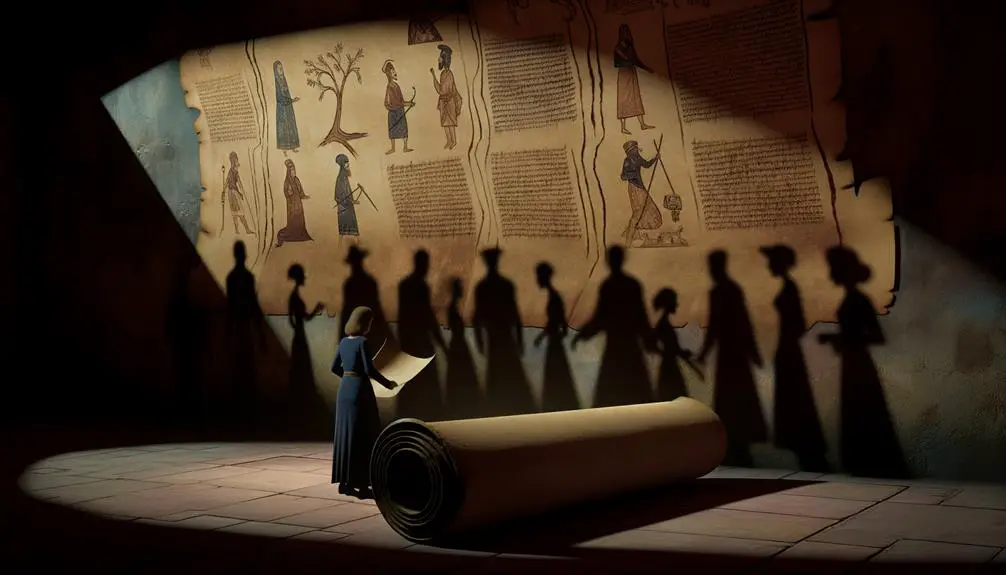
Within the biblical narrative, numerous accounts of incest and deceit highlight the complex moral landscape and societal norms of the time. These stories, while disturbing to modern readers, reflect the intricate family dynamics and instances of moral ambiguity that permeate the text. As you delve into these tales, you encounter a world where the lines between right and wrong blur, offering a mirror to the multifaceted nature of human relationships.
One of the most notable examples involves Lot and his daughters, who, believing themselves to be the last humans on Earth, engage in incest to continue their lineage. This story, aside from its immediate shock value, prompts you to ponder the motivations behind their actions and the societal context that could foster such a decision. It's a stark representation of survival instincts intersecting with familial bonds, wrapped in layers of desperation and misunderstanding.
Another instance of deceit comes from the story of Jacob and Esau, where familial manipulation leads to the theft of a birthright. This narrative doesn't just showcase personal ambition but also illuminates the complex dynamics within a family, where love and rivalry coexist, leading individuals down morally ambiguous paths.
These stories, while initially seeming to be mere accounts of immorality, serve a deeper purpose. They compel you to question not just the actions of the characters but the societal constructs that guided their decisions. The tales of incest and deceit in the Bible, thus, provide a rich tapestry for exploring the nuances of human behavior, morality, and the ever-evolving concept of family.
Reconciling Ancient Texts With Modern Morality
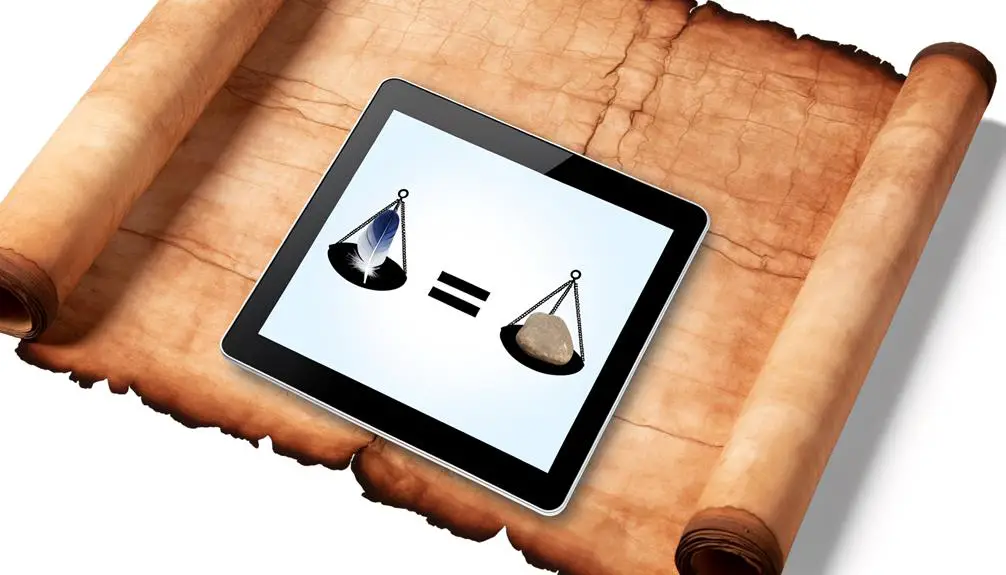
You must consider the historical context to understand the ethical perspectives presented in ancient texts like the Bible. Ethical norms have evolved over time, highlighting the need to interpret ancient morality through the lens of contemporary values.
This approach will help you navigate the complexities of reconciling ancient texts with modern morality.
Historical Context Matters
Understanding the historical context of ancient texts is crucial in reconciling them with modern morality. When you delve into the narratives and laws within the Bible, interpreting them through the lens of cultural relativism and avoiding ethical anachronism become essential. This approach doesn't excuse immoral acts but seeks to understand them within their own era's norms and values.
- Cultural Relativism: Recognizes the diversity of moral practices across different societies.
- Ethical Anachronism: Avoids judging past actions by contemporary standards.
- Historical Context: Provides insight into the socio-political and economic conditions influencing moral codes.
Ethical Evolution Over Time
As we examine the progression of moral standards, it's evident that ethical norms have evolved significantly since the era of biblical texts, necessitating a nuanced approach to reconciling these ancient writings with contemporary values.
This evolution highlights the concept of moral relativism, where ethical standards aren't fixed but change over time and across cultures. You'll find that what was once considered morally acceptable is now often viewed through a critical lens.
This shift demands a careful analysis to understand the context in which these biblical narratives were written and their relevance today. It's a complex process that involves balancing respect for historical texts with the recognition that our current ethical standards have shifted, reflecting a broader understanding of morality in today's diverse and interconnected world.
Interpreting Ancient Morality Today
Interpreting ancient morality through the lens of modern ethics requires a delicate balance between historical context and contemporary moral values. This process must navigate between two philosophical poles: cultural relativism and moral absolutism. Here's how you can approach this:
- Understand Cultural Relativism: Recognize that moral standards can vary significantly across different cultures and time periods. This perspective encourages you to see ancient texts as products of their time.
- Consider Moral Absolutism: Some argue for universal moral principles that transcend time and culture. Evaluate whether certain actions described in ancient texts infringe upon these timeless values.
- Apply a Balanced Analysis: Merge insights from both views to form a nuanced understanding that respects historical context while critically examining ancient morality against today's ethical standards.
Frequently Asked Questions
How Do Different Religious Traditions Interpret Morally Controversial Passages in the Bible?
You'll find that various religious traditions grapple with morally controversial passages in the Bible through a lens of interpretive diversity. They don't all agree on what these passages mean or how they should impact modern life.
Some view them as historical context, while others see them as divine commandments that are timeless. This range of interpretations showcases the complexity of integrating ancient texts into contemporary moral frameworks.
Can the Concept of Immorality in the Bible Evolve With Contemporary Ethical Standards, or Is It Fixed?
You're navigating the crossroads where moral absolutism meets ethical relativism. This isn't about ancient texts but how contemporary ethical standards can reshape our understanding of right and wrong.
Can these principles evolve, or are they etched in stone? It's a debate that stretches beyond the confines of religious doctrine, challenging us to ponder whether our moral compass should remain static or adapt to the shifting sands of societal progress.
How Do Atheists and Agnostics View the Moral Teachings and Controversies in the Bible?
You might find that atheists and agnostics often approach the Bible's moral teachings and controversies with secular criticism rather than divine morality.
They tend to analyze these narratives through a lens that doesn't presuppose the existence of a deity, focusing instead on ethical standards that evolve over time.
This perspective allows them to question and critique the moral implications of biblical stories without being bound by religious dogma.
What Role Do Cultural and Historical Contexts Play in Understanding the Morality Depicted in the Bible?
To grasp the Bible's moral views, you'll find cultural and historical contexts crucial. They act as lenses, highlighting how norms and values shift over time, a concept known as historical relativism. This approach underscores that morality isn't static but evolves.
Cultural interpretation further enriches this understanding, revealing how diverse communities perceive biblical morals. Together, these frameworks offer a nuanced analysis, essential for fully appreciating the moral landscape presented in the scriptures.
Are There Examples of Biblical Narratives That Have Been Reinterpreted in Modern Times to Reflect a More Progressive Moral Stance?
Yes, numerous biblical narratives have been reinterpreted through literary adaptations and feminist perspectives to reflect modern, progressive moral stances.
You'll find that stories once framed in a certain light are now explored for their deeper, often overlooked meanings.
These reinterpretations challenge traditional views, offering fresh insights into characters and events.
For instance, feminist readings have reclaimed certain female figures, highlighting their strength and agency, and promoting a more inclusive understanding of morality.
Conclusion
Navigating the complexities of biblical morality, you're confronted with a tapestry of human history, interwoven with threads of divinity and fallibility. These ancient narratives, brimming with violence, subjugation, and moral paradoxes, challenge you to ponder: Can timeless wisdom coexist with temporal immorality?
As you delve deeper, the tension between past and present ethics intensifies, urging a critical reevaluation of spirituality and ethics. In this quest, the ultimate resolution remains tantalizingly elusive, beckoning further scholarly exploration and introspection.



Sign up